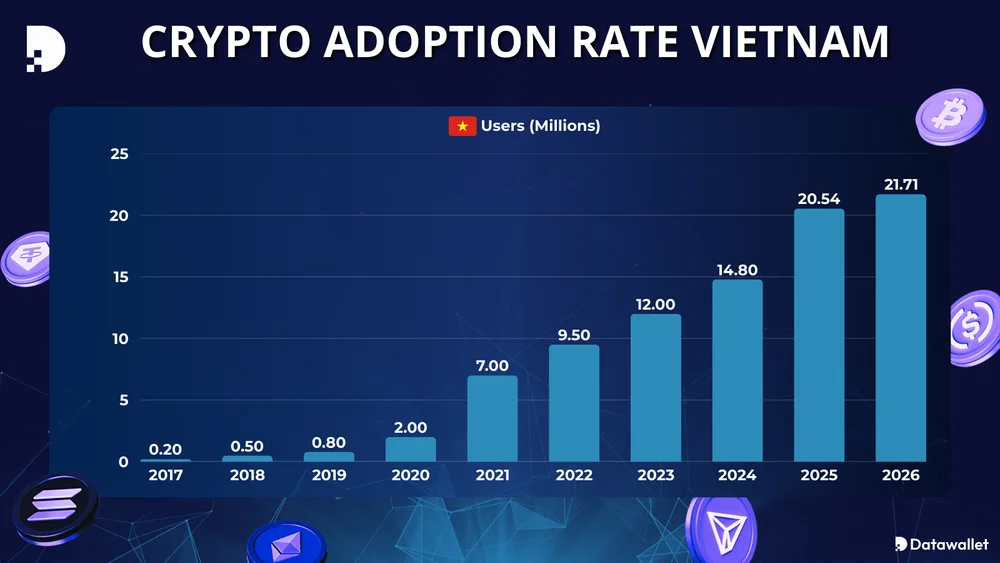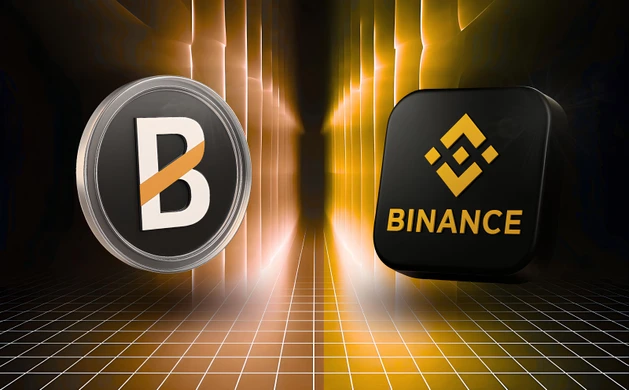6 Best Crypto Exchanges in Vietnam
.webp)
Summary: Vietnam is moving to a regulated model under the Digital Technology Industry Law taking effect in 2026, with a pilot already enforcing VND-settled activity, AML/KYC, and tighter oversight while crypto remains banned for payments.
Investors should favor exchanges that support VND funding (bank transfers, MoMo, ZaloPay, cards or P2P), publish proof of reserves, and provide reliable Vietnamese or English support. Here are the six best crypto exchanges in Vietnam for 2025:
Bybit is the best choice for Vietnam as it offers VND funding via banks, MoMo, and ZaloPay, 2,000+ assets with low fees, and direct ties to Vietnam’s regulatory pilot program.
Fees
0.1% Spot Trading Fee
Available Cryptos
2,000+ Cryptocurrencies
VND Deposit Methods
Bank transfers, VietQR, MoMo, ZaloPay & More
Top Crypto Trading Platforms in Vietnam
For investors in Vietnam, the main factors when choosing a crypto exchange are regulatory compliance, fund security, and trading fees. Leading platforms accept Vietnamese Dong (VND) deposits through bank transfers, e-wallets like MoMo and ZaloPay, and Visa or Mastercard.
Exchanges serving Vietnamese users should offer a wide range of digital assets, audited proof-of-reserves, and Vietnamese or English-language support. Compliance with Vietnam’s State Bank guidance and adherence to AML/KYC standards are key for mitigating risk.
The table below compares the best cryptocurrency exchanges in Vietnam across fees, deposit options, asset coverage, and standout features:
Exchange |
Cryptocurrencies |
Trading Fees |
Deposit Methods |
Key Features |
|---|---|---|---|---|
| Bybit | 2,000+ |
0.1% |
Bank Transfers, MoMo, ZaloPay, Visa, Mastercard |
Futures up to 200x, Copy Trading, Grid Bots, Bybit Earn, Cashback Card, Partner of Vietnam’s Finance Ministry |
| Binance | 500+ |
0.1% |
Bank Transfers, P2P Marketplace, Visa, Mastercard |
Deepest Liquidity, P2P VND Trading, Launchpool, Futures, Earn, Auto-Invest, NFT Marketplace |
| BloFin | 100+ |
Futures Maker 0.02% |
Credit/Debit Cards, Apple Pay, Google Pay |
No-KYC Trading, High-Leverage Futures, Copy Trading, Grid & DCA Bots |
| Gate | 3,600+ |
0.2% (reduced with GT) |
Bank Cards, Apple Pay, Google Pay, Samsung Pay |
Altcoin Leader, Bots, Copy Trading, Prime Traders Marketplace, Staking, Quick Convert |
| BitcoinVN | ~83 |
0.5% Deposit, 0.75% Exchange Fee |
Bank Transfers, Credit Cards, Cash, MoMo, Vietcombank |
Vietnam’s First Exchange, Local ATMs, Instant Swaps, SSC Regulated |
| OKX | 350+ |
Maker 0.08% / Taker 0.1% |
Bank Cards, Third-Party Processors |
OKX Wallet, DEX Aggregator, Web3 Access, Staking, Futures, NFT Trading |
1. Bybit - Most Trusted Exchange in Vietnam
Bybit is the top choice for Vietnamese investors, combining liquidity, low fees, and a wide product range. Founded in 2018, it processes over US$30 billion in daily trading volume and supports VND deposits through bank transfers, MoMo, ZaloPay, Visa, and Mastercard, giving traders direct access to global markets.
The exchange offers 2,000+ cryptocurrencies for spot trading and more than 400 perpetual and futures contracts with leverage up to 200x. Advanced tools such as copy trading, grid bots, and analytics support active traders, while Bybit Earn enables staking, lending, and liquidity mining. The Bybit Card adds everyday use with cashback on crypto spending.
Bybit’s credibility in Vietnam is reinforced by its partnership with the Ministry of Finance. In April 2025, CEO Ben Zhou met with officials to confirm a pilot program for crypto trading, with Bybit providing infrastructure and risk controls to help shape Vietnam’s regulatory framework.
Platform Highlights:
- Fees: Spot trading from 0.1%
- Supported Assets: 2,000+ cryptocurrencies
- Regulation & Licensing: Partnering with Vietnam’s Ministry of Finance; compliant with AML/KYC standards
- VND Deposit Methods: Local bank transfers, MoMo, ZaloPay, Visa, Mastercard

2. Binance - Best for Deepest Liquidity in Vietnam
Binance is the largest cryptocurrency exchange and a top choice for Vietnamese traders who value liquidity and low fees. With 270 million users worldwide and billions in daily turnover, it delivers unmatched depth on pairs like BTC/USDT, ETH/USDT and SOL/USDT, ensuring fast execution and minimal slippage.
Vietnamese users can fund accounts in VND through bank transfers and the P2P marketplace, which offers zero-fee trades with thousands of verified counterparties. This makes Binance one of the most reliable ways to convert between VND and stablecoins.
The exchange lists 500+ cryptocurrencies and supports spot, margin, and futures trading, alongside Launchpool, staking with Binance Earn, and auto-invest plans. NFT markets, crypto loans, and ETH staking add further utility. Security is backed by proof-of-reserves, strict KYC/AML controls, and round-the-clock support.
Platform Highlights:
- Fees: Spot trading from 0.1%
- Supported Assets: 500+ cryptocurrencies
- Regulation & Licensing: Operates under global VASP registrations; recognized for strong AML/KYC enforcement
- VND Deposit Methods: Local bank transfers, P2P marketplace, Visa, Mastercard

3. BloFin - Best No KYC Exchange in Vietnam
BloFin is the top no-KYC exchange for Vietnamese traders who prioritize privacy and quick access. Handling about US$1 billion in daily volume, it offers strong liquidity on spot and perpetual futures markets without requiring identity checks, making it appealing to users seeking anonymity.
The platform lists 100+ cryptocurrencies and supports perpetual contracts with adjustable leverage. Tools include copy trading and automated strategies such as grid and DCA bots. Security is reinforced through proof-of-reserves, layered protections, and third-party custody.
The trade-off is regulatory risk. BloFin operates offshore and is not licensed by the State Bank of Vietnam or other authorities. It suits experienced traders comfortable with unregulated platforms rather than those who want regulatory protection.
Platform Highlights:
- Fees: Futures maker fees from 0.02%
- Supported Assets: 100+ cryptocurrencies
- Regulation & Licensing: Offshore; not licensed in Vietnam or major jurisdictions
- VND Deposit Methods: Credit/debit cards, Apple Pay, Google Pay

4. Gate - Best Exchange for Altcoin Traders in Vietnam
Gate is a top choice in Vietnam for traders focused on asset variety. With over 37 million users and a proof-of-reserves ratio above 120%, it lists more than 3,600 cryptocurrencies, from large caps to early listings. Holding GateToken (GT) reduces trading fees and unlocks platform perks.
The exchange supports spot, margin, and futures markets along with a broad range of automated strategies. Grid, DCA, and smart rebalance bots include public performance records, while copy trading and the “Prime Traders” marketplace give users access to proven strategies.
Gate also offers Quick Convert for instant swaps, advanced charting with professional order types, and Simple Earn for staking and lending with hourly accrual. Vietnamese users can fund accounts with VND using bank cards and global payment services like Apple Pay and Google Pay.
Platform Highlights:
- Fees: Spot trading from 0.2%, lower with GT
- Supported Assets: 3,600+ cryptocurrencies
- Regulation & Licensing: Operates globally; not licensed in Vietnam
- VND Deposit Methods: Bank cards, Apple Pay, Google Pay, Samsung Pay

5. BitcoinVN - Honorable Mention for Local Traders
BitcoinVN, founded in 2013 in Ho Chi Minh City, is Vietnam’s first crypto exchange. It appeals to users who prefer local services, offering VND deposits through bank transfers, cash, and e-wallets like MoMo and Vietcombank. The exchange also runs Bitcoin ATMs across Ho Chi Minh City, giving it a local presence that global platforms lack.
The platform supports about 80 cryptocurrencies with instant swaps and basic staking options. While fees are competitive, the interface and liquidity are limited compared to leading international exchanges, which may affect execution quality and overall user experience.
BitcoinVN is regulated by the State Securities Commission of Vietnam (SSC), offering some oversight. It suits beginners who value domestic platforms, but global exchanges such as Bybit or Binance provide stronger security, deeper markets, and more advanced trading features.
Platform Highlights:
- Fees: 0.5% Deposit Fee and 0.75% Exchange Fee (Most Expensive)
- Supported Assets: ~83 cryptocurrencies
- Regulation & Licensing: Overseen by the State Securities Commission of Vietnam (SSC)
- VND Deposit Methods: Bank transfers, credit cards, cash, MoMo, Vietcombank

6. OKX - Strong Overall Alternative in Vietnam
OKX combines centralized trading with a Web3 ecosystem, making it a versatile option for Vietnamese users. Its exchange offers liquid spot and derivatives markets, TradingView charts, copy trading, and grid bots. The OKX Wallet spans 130+ networks, enabling storage, swaps, staking, bridging, and direct dApp access.
The wallet’s DEX Aggregator sources liquidity from 400+ decentralized exchanges via X Routing, splitting orders for best pricing and lower slippage. Users can switch between Easy or Advanced modes, run MEV-protected swaps, and monitor on-chain activity in real time.
Institutions gain high-throughput APIs and reporting, while retail users benefit from a reliable mobile app, fiat on-ramps, and the choice to operate fully on-chain. Though not licensed locally, OKX adheres to global compliance standards and remains a strong alternative to Bybit and Binance in Vietnam.
Platform Highlights:
- Fees: Spot maker fees from 0.08%, taker fees from 0.1%
- Supported Assets: 350+ cryptocurrencies
- Regulation & Licensing: Operates globally with compliance measures; not licensed in Vietnam
- VND Deposit Methods: Bank cards, third-party processors

Is Crypto Legal and Regulated in Vietnam?
Vietnam is shifting from ambiguity to regulation on crypto. For years, the State Bank banned its use in payments, and asset ownership remained undefined.
This changed in June 2025 when the National Assembly passed the Law on Digital Technology Industry, effective January 1, 2026. The law formally recognizes digital assets, separating them from securities and fiat, and creates a legal base for regulated trading.
In preparation, Vietnam introduced a five-year pilot program with strict oversight. All crypto activity must settle in Vietnamese dong, issuers must be registered local companies, and assets cannot be backed by fiat or securities. Service providers need 10 trillion VND in capital, qualified executives, and strong technical teams.
From 2026, businesses will follow mandatory AML, KYC, and cybersecurity requirements under FATF guidelines. Oversight will fall to the Ministry of Finance, the State Bank, and related agencies. Crypto remains recognized as an asset but cannot yet be used directly for payments.
💡 Regulation Timeline in Vietnam
- 2017: State Bank bans crypto as a payment method
- 2018: Stricter directives target fraud and unlicensed activity
- 2023: Vietnam added to FATF gray list for weak AML controls
- June 2025: National Assembly passes Digital Technology Industry Law
- Mid-2025: Five-year regulated pilot launched with strict capital and licensing rules
- Jan 2026: Law takes effect, crypto formally recognized as legal assets
How is Crypto Taxed in Vietnam?
Cryptocurrency taxation in Vietnam remains unclear as the country prepares to implement the Digital Technology Industry Law in January 2026. While crypto assets will soon be formally recognized, the General Department of Taxation currently applies existing rules to trading, investment, and business activity.
The main tax categories are:
- Corporate Income Tax (CIT): Companies offering crypto services such as exchanges, mining, or blockchain products are subject to the standard 20% corporate income tax on net profits.
- Personal Income Tax (PIT): Individual investors earning income from trading, mining, staking, or airdrops fall under Vietnam’s progressive PIT rates of 5% to 35%, depending on total annual income. Capital gains from selling crypto are taxed under this system.
- Value-Added Tax (VAT): A 10% VAT may apply to service fees from exchanges or platforms. The crypto assets themselves are not subject to VAT.
Until the 2026 law takes effect, investors should keep detailed records of transactions in VND and seek professional advice to comply with Vietnam’s evolving tax policies.
💡 Practical Example: Tax on Crypto Trading in Vietnam
- Profit: $5,000 (~120 million VND) from selling Bitcoin
- PIT Bracket: Falls into the 20% income tax band
- Tax Owed: ~24 million VND (about $1,000)
This illustrates how profits from crypto trades are treated like other taxable income under Vietnam’s personal income tax framework.
Cryptocurrency Adoption in Vietnam
Vietnam’s cryptocurrency market is projected to generate US$1.9 billion in revenue in 2025, with growth of 25.47% year-on-year, reaching US$2.4 billion by 2026. Average revenue per user is estimated at US$92.5, underscoring significant transaction activity.
The number of users is forecast to climb to 21.7 million by 2026, representing over one-fifth of the population. This rapid adoption reflects strong demand from Vietnam’s young, digitally connected population and its role as a regional leader in blockchain-based applications, including play-to-earn gaming and DeFi.

How to Buy Bitcoin in Vietnam - Step By Step
The safest way to buy Bitcoin (BTC) in Vietnam is through international exchanges that accept Vietnamese users and follow AML and KYC standards. Platforms such as Bybit, Binance, and OKX offer BTC/USDT and BTC/VND markets with strong liquidity.
- Select an Exchange: Pick a trusted platform available in Vietnam with VND on-ramps or peer-to-peer (P2P) markets for funding.
- Create Your Account: Register and verify your identity using a Vietnamese ID card, passport, or driver’s license.
- Deposit VND: Add funds through local bank transfers, MoMo, ZaloPay, Vietcombank, or P2P trades. Visa and Mastercard are also available for faster deposits.
- Buy Bitcoin (BTC): Go to the BTC/USDT or BTC/VND market, enter the amount, and confirm the order.
After purchase, move Bitcoin to a secure wallet. Hardware wallets like Ledger or Trezor provide the highest protection, while trusted mobile wallets are suitable for everyday use.
Final Thoughts
Vietnam’s crypto market is entering a new phase of regulated growth, giving investors more secure options to buy and trade digital assets. Bybit and Binance provide the strongest mix of liquidity, features, and VND support, while Gate and OKX cater to traders seeking variety and advanced tools.
With the 2026 law set to formalize crypto as a legal asset class, the most effective approach for investors is to use licensed, AML/KYC-compliant exchanges today and prepare for stricter oversight in the years ahead.
Frequently asked questions
What role do stablecoins play in Vietnam’s crypto trading market?
Stablecoins like USDT and USDC are the backbone of trading in Vietnam, often used as the bridge between VND and other cryptocurrencies. P2P markets rely heavily on these assets for settlement, making them central to liquidity and price stability for Vietnamese traders.
Are crypto remittances popular in Vietnam?
Yes, Vietnam is one of the world’s largest recipients of remittances, and many overseas workers use crypto to send money back home. Exchanges and P2P platforms make it possible to convert stablecoins into VND at lower costs than traditional remittance services, though regulation in this area is still evolving.
What international restrictions affect Vietnamese crypto traders?
Many global exchanges serve Vietnamese users, but some platforms restrict access depending on licensing or compliance with FATF gray list monitoring. Traders should confirm availability of features such as futures or staking, as these may be limited for Vietnamese accounts compared to other regions.
How does Vietnam’s FATF gray list status impact crypto exchanges?
Vietnam was placed on the FATF gray list in 2023 due to gaps in anti-money laundering enforcement. This makes international exchanges more cautious, often requiring stricter KYC for Vietnamese accounts and closer monitoring of transactions to align with FATF standards.

Written by
Emily Shin
Research Analyst
Emily is passionate about Web 3 and has dedicated her writing to exploring decentralized finance, NFTs, GameFi, and the broader crypto culture. She excels at breaking down the complexities of these cutting-edge technologies, providing readers with clear and insightful explanations of their transformative power.









